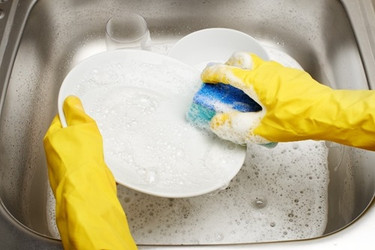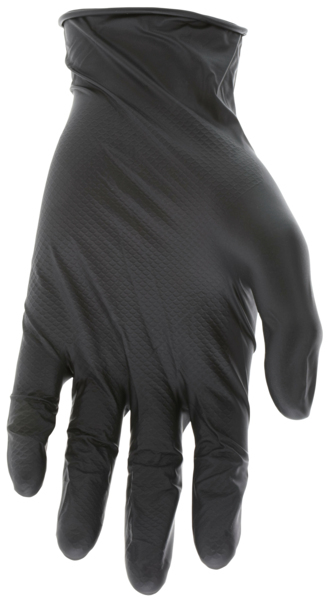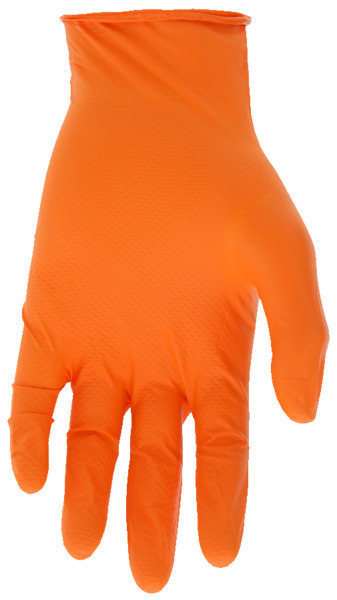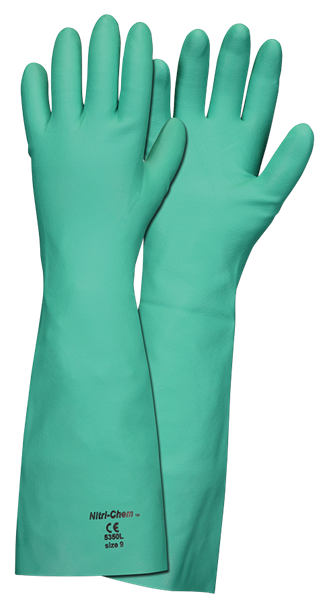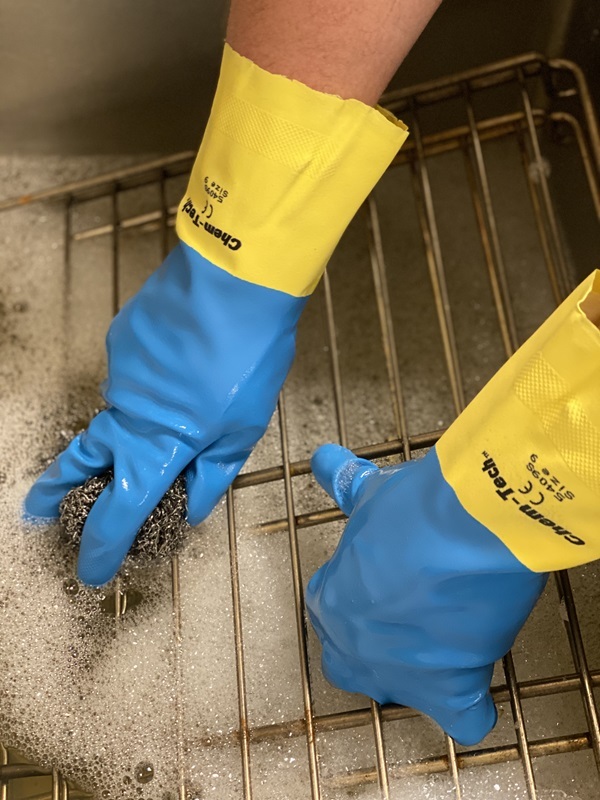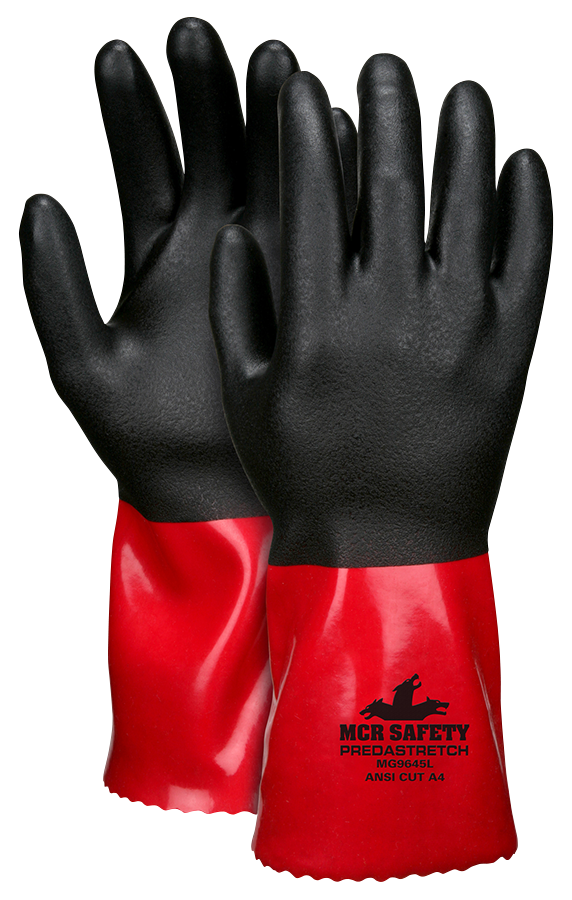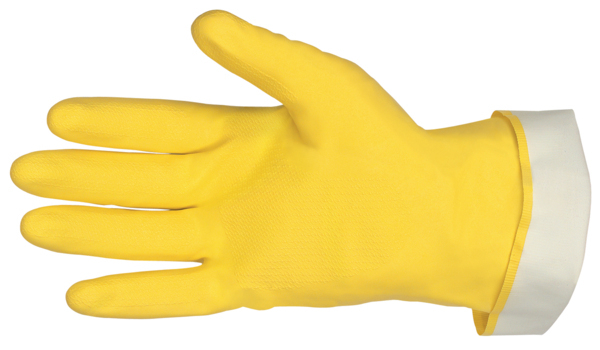Our Best Dishwashing Gloves Explained
Posted by Anthony Webb on Aug 22nd 2025
Washing the dishes is an essential chore that people tend to either love or hate. Some find it overwhelming to see a sink full of dirty dishes, while others find getting their hands in warm, soapy water to be therapeutic. No matter which category you fall into, it is essential to make sure you are taking the proper steps to clean and sanitize dishes while also protecting your health and well-being. The first question most people ask as they prepare to complete this task: where are my dishwashing gloves?
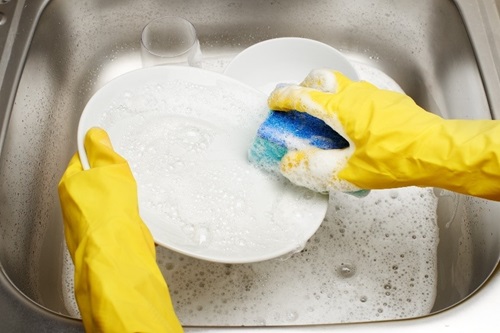
Dishwashing gloves have advanced from the yellow rubber most conceptualize.
For those who might be thinking, it's only a little hot water and dish soap, think again. Occupational dishwashers are the 4th highest occupation to experience cut injuries, ranking higher than mechanics, jailers, and construction laborers. All it takes is one broken dish or glass, and you could find yourself in the emergency room getting stitches. However, the potential hazard of cut injuries is reduced for those who choose to wear dishwashing gloves made to be both waterproof and cut-resistant.
Dishwashing gloves are essential personal protective equipment (PPE), whether you are washing dishes after a family dinner or keeping a restaurant's dishes clean for guests. Let us show you some of the best dishwashing gloves MCR Safety has to offer.
OSHA and Hazards Faced
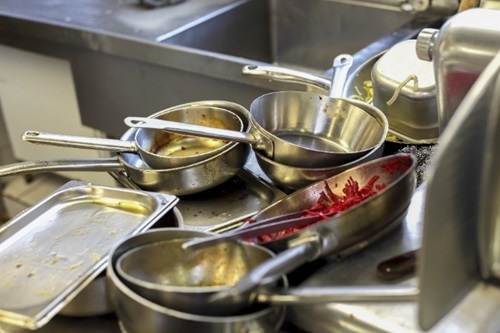
Dishwashing does not come without potential dangers due to the nature of the job. In order to get dishes clean and sanitized, dishwashers may be exposed to a few hazards.
Chemicals
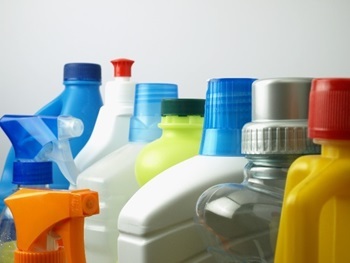
Keeping food areas sanitized is an absolute must, whether at home or in a restaurant. With that said, getting dishes and work areas clean is no small accomplishment. Dishwashers are often exposed to chemicals, like ammonia solutions, that lift grease from plates and silverware. They may also encounter other cleaning chemicals such as chlorine bleach, soaps, and other abrasive cleaners as they maintain the kitchen area.
Exposure to these chemicals can cause everything from mild irritation to the skin and eyes to dermatitis to burns of the skin.
Cuts
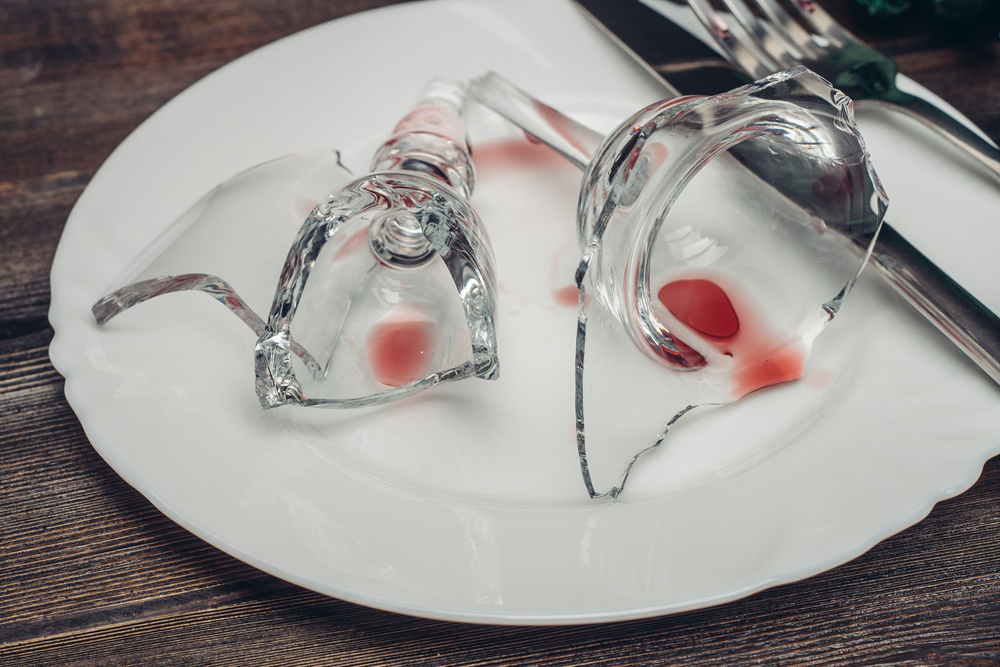
Cuts may occur when handling sharp objects such as knives and other utensils. Wounds can also be caused by broken glass, either from breaking during handwashing or chipping underwater, leaving dangerous glass shards that are difficult to see in the sink.
Heat
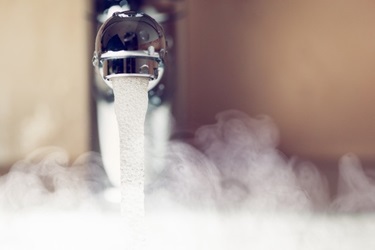
For dishes to be properly sanitized, the water used to clean them must be kept at a high temperature. Mechanical dishwashers themselves are a hot water hazard for professionals.
As the dishwasher runs their hands through a machine, they run the risk of scalding or burning their hands and forearms.
Additional Safety Resources:
The Benefits of PPE
![]()
Using personal protective equipment—or PPE—is essential in maintaining your safety and well-being while washing dishes. In most cases, using a set of gloves on the job will protect you from the hazards mentioned above. Also, gloves serve several functions when put into use. For example, they can protect your skin from irritation and protect your skin from dermatitis caused by regularly using detergents that are too harsh for human skin.
Our next section covers some of the best styles we've developed during our more than 45 years of providing hand protection solutions.
MCR Safety's Best Options

When it comes to your safety while washing dishes, MCR Safety has you covered with a wide selection of gloves to keep you protected.
Here are some of our top-selling dishwashing gloves:
- Disposable gloves – Our Grippaz gloves are a top choice because of their enhanced fish scale grip. They are also great for wearing under thicker gloves to protect your skin.
- Nitrile gloves - provide protection of just not your hands but also your wrists and forearms enhance worker safety. Long gloves are perfect commercial gloves used in businesses where you may be dishwashing extensively for an entire shift.
5350 18" long option
For those who don't need an 18" long option, our 5319 is one of our top-selling products.
- Neoprene Gloves – These heavy-duty gloves are an excellent choice for jobs that require durable protection due to exposure to chemicals or extreme temperatures. Another popular option many wear is our 5409S, a neoprene over latex glove. When hot objects or hot water is also a concern, our 6944 is commonly used.
5409S Neoprene over Latex dishwashing glove
- Waterproof, cut-resistant gloves – The MG9645 is made of unique materials to reduce the risk of cutting your skin on broken glass or sharp utensils. Our MG9645 is super lightweight and lined with a cut-resistant shell, providing users with A4 cut resistance and ANSI Level 1 heat protection.
- Latex Gloves – Yes, yellow dishwashing gloves, like our flock-lined 5290 and unlined 5290P, are still popular choices and classically iconic. However, there are many other latex gloves to consider for your dishwashing needs. Our 5049 super-thick disposable gloves provide users with a tight-fitting option.
- Heat-Resistant and Waterproof - As we mentioned earlier, heat can be a concern for dishwashers. Here is a list of waterproof glove options sorted by heat-resistance:
Level 5 Heat - 6944
Level 4 Heat – 6845
Level 2 Heat – 6912
Level 1 Heat – MG9648
View our full catalog to find the perfect glove that will help you not only get the job done but get it done safely. MCR Safety sells its products to some of the most reputable industrial distributors all over the country. For any glove shown above, we can provide information on local outlets in your area that carry it in stock.
Professional Dishwashing Outlook
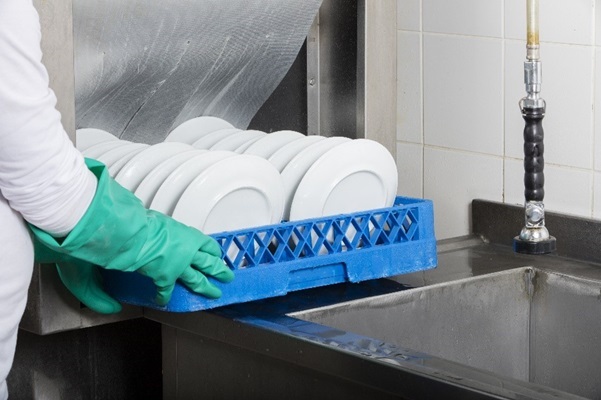
According to the Bureau of Labor Statistics (BLS), 504,770 people were employed as professional dishwashers in 2018. Dishwashers are typically used by:
- Restaurants – 375,940 employed
- Special food services – 33,360 employed
- Amusement and recreation industries – 30,340 employed
- Continuing care facilities – 9,790 employed
Specific tasks that could make up the professional profile of a dishwasher include:
- Washing dishes, glassware, flatware, pots, pans by hand, using mechanical dishwashers
- Maintaining kitchen work areas, equipment, or utensils in clean and orderly condition.
- Placing all clean dishes, utensils, or cooking equipment in storage areas.
- Sorting and removing trash and placing it in designated pickup areas.
- Sweeping and scrubbing floors in kitchen work areas.
As we highlighted above, these workers experience some of the highest cut-injury rates across all industries. Please do not take this worker's role for granted or think that only a simple disposable glove is applicable for all situations these workers face. For many restaurants, it makes perfect sense for kitchen staff to have a liquid- and cut-resistant glove close by, even if not worn for an entire shift.
What does good dishwashing look like?
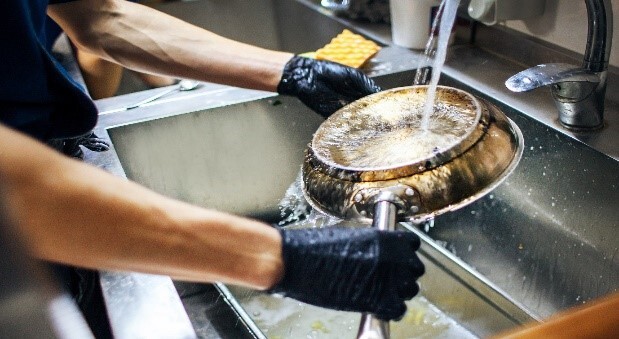
Believe it or not, dishwashing isn't as simple as rinsing a couple of plates and calling it a day. Being a full-time dishwasher entails quite a bit of responsibility and helps keep many industries running smoothly and efficiently.
Just the act of washing dishes, glassware, and utensils requires several steps, integral to making sure everything is sanitary and free of debris and bacteria.
To properly wash dishes, you must:
- Prep your dishes by scraping any leftover food or debris from the plates before beginning your task.
- Fill your house sink or workstation with clean, hot, and soapy water.
- Scrub dishes under the water to ensure they're clean.
- Rinse all suds and soap residue from the plates.
- Dry the dishes with a towel or allow them to air dry in a rack.
Some additional tips for proper cleaning of dishes that many overlook include:
- Always remember to wash the rim of the glassware, not just the inside.
- For safety, make sure you never put your hand inside glassware to wash it. Use a brush or sponge to reduce the risk of glass breaking and potentially causing cut injuries.
- When washing utensils, don't forget to wash the handles where they have been touched.
- Rinse your dirty pots before cleaning in warm soapy water to make cleaning more manageable.
Frequently Asked Questions

Can you put rubber gloves in the dishwasher?
- No. The heating element of a dishwasher may melt or warp the gloves, compromising their integrity, so you should not consider this as an option.
Do dishwashing gloves have latex?
- If you have a latex allergy, you have to be especially careful when choosing a dishwashing glove to use. Many gloves do contain latex, but there are plenty of options for those who are allergic. Find gloves that are made of alternate materials such as vinyl, nitrile, or synthetic latex. Read up more on latex-free allergy gloves here.
How long do dishwashing gloves last?
- It all depends on what you're scrubbing and the amount of pressure put on the gloves. As with all things, the higher the quality material found in the glove, the more likely it is to last longer. If the glove's price seems too good to be true, it's a reasonably good indicator you're buying lower quality material, many times filled with additional fillers outside the core polymer. This may result in shorter wear life.
Are dishwashing gloves recyclable?
- Our new 5380 are one example of biodegradable gloves.
Washing Dishes Safely
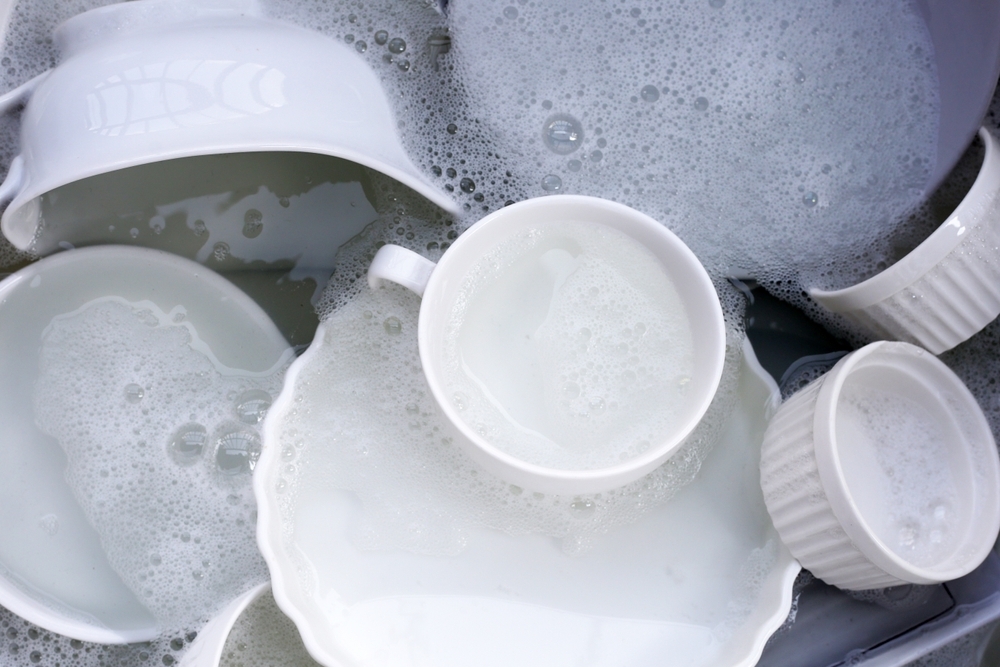
While dishwashing is a chore, we all must perform the task at some point. For some, dishwashing is a full-time occupation with its share of hazards and risks. Ensuring you are protecting your skin from harsh chemicals, sharp objects, detergents, and hot water is vital to your well-being and health.
Click the image above to request a quote, leave us a comment, ask a question, or share any concerns.
For over 45 years, MCR Safety has proven to be a world leader in gloves, glasses, and garments. Whether it's on the shop floor, an oil rig, or a construction site, we are there to provide solutions to workplace hazards. It's all part of our commitment to protect people.
No matter your industry, we have the personal protective equipment you need.
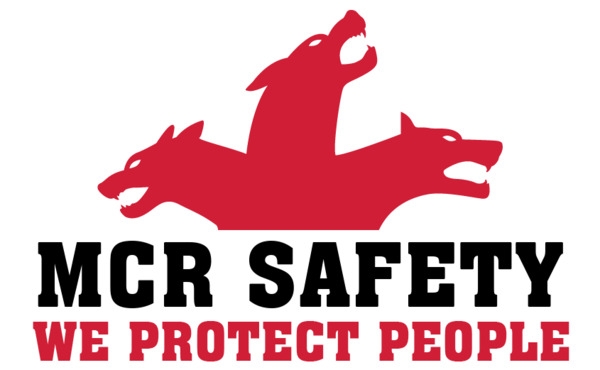
Learn more about MCR Safety by checking out our most recent video. For more information, browse our website, find a distributor, or give us a call at (800) 955-6887.

